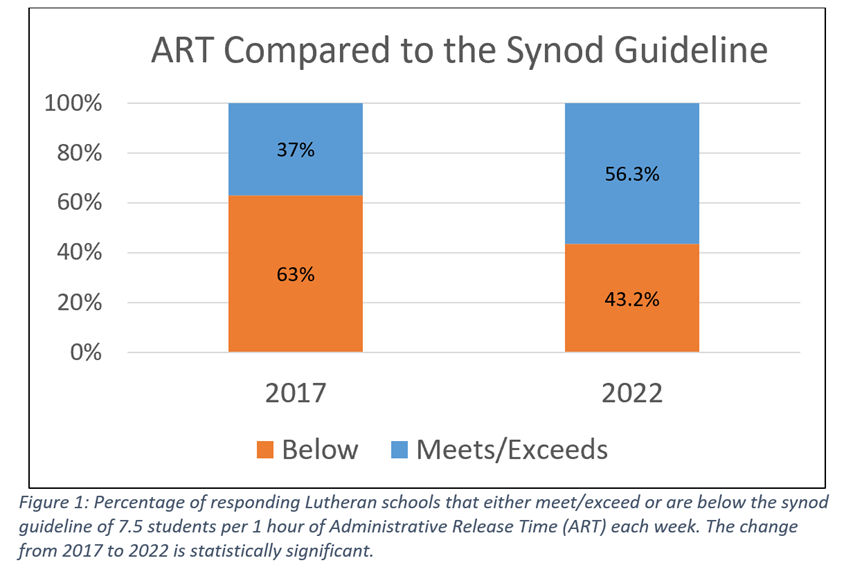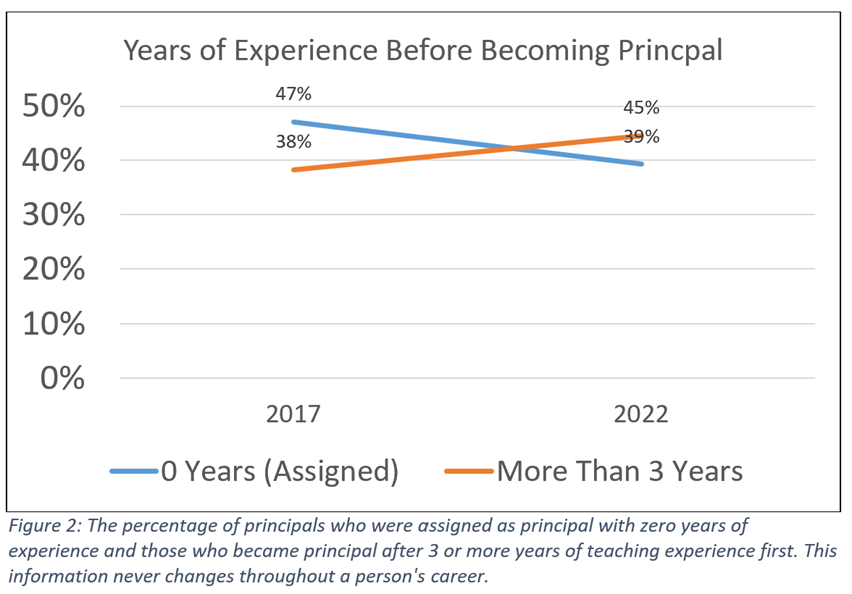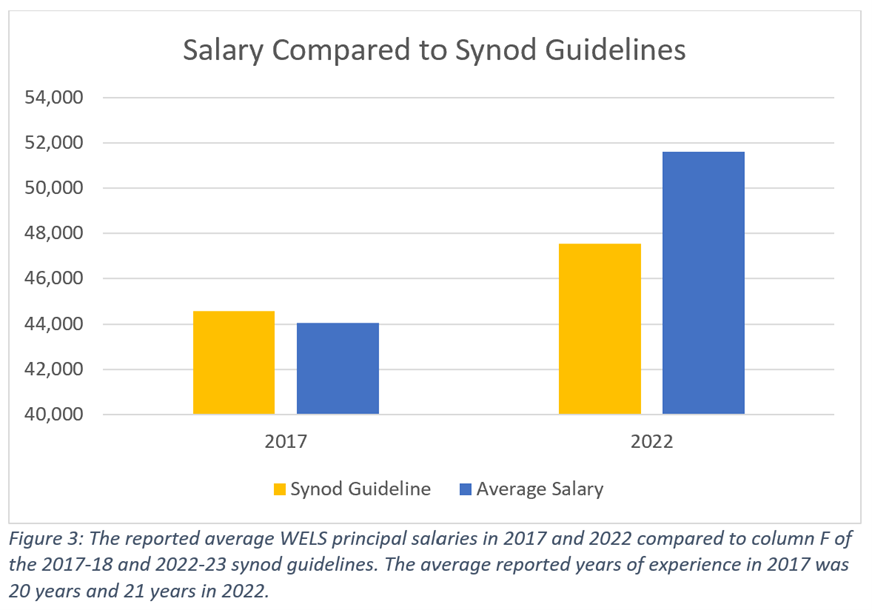Written by Dr. John Meyer
Five years ago, I asked the question, “Can Lutheran schools reimagine the principal position” (Meyer, 2017)? The answer is a resounding “Yes!”
At that time, the Wisconsin synod had just begun a system-wide effort to increase Lutheran principal time, training, and compensation. The goal was to increase principal effectiveness and retention so that Lutheran schools and students would thrive.
Five years later, new data reveals that those efforts are having their intended effects. A study conducted by Meyer and Rademan (2022) compared current levels of administrative release time, compensation, and training to those reported in a baseline survey from 2017. The results were both practically and scientifically significant.
Time
Having sufficient time to be an effective school leader is the Lutheran principal’s greatest concern (Meyer et al., 2015). In the past Lutheran principals were primarily classroom teachers who fulfilled the administration and leadership tasks outside of the school day. As late as 2015, 82% of the principals reported they did not have enough time to do their jobs (Meyer et al., 2015).
The term Administrative Release Time (ART) describes non-teaching time during the school day that is set aside for a teaching principal’s administrative duties. The 2017 synod convention reaffirmed the guideline of 1 hour per week of ART for every 7.5 students in the school (Wisconsin Evangelical Lutheran Synod, 2017, pp. 45-46). At that time, just 37% of the schools met that guideline, but today 56% do. Also, principals reported four more hours per week of ART on average than they did five years ago (Meyer & Rademan, 2022).
Training
Until recently, few Lutheran schools required their principals to have formal leadership training or experience before assuming that role. Before the changes in 2017, 74% of the Lutheran principals believed they were not adequately trained (Meyer et al., 2015), and 47% reported becoming the principal right out of college with only a teaching degree (Meyer & Rademan, 2017).
The new data shows that the Lutheran school principal workforce is becoming better trained and more experienced. Today 55% of Lutheran principals have a master’s degree or higher, which compares to 41% with a master’s in 2017 and 26% in 2004 (US Department of Education, 2004). Also, 45% reported at least three years of teaching experience before becoming the principal (Meyer & Rademan, 2022).
Compensation
Lutheran principals are motivated more by service than salaries, but compensation does impact job satisfaction. In 2015, 57% of Lutheran principals reported that their compensation levels were inadequate (Meyer et al., 2015). The synod responded by adopting new compensation guidelines with special attention given to increasing principal salaries (Wisconsin Evangelical Lutheran Synod, 2017, p. 39).
The average reported principal salary increased substantially in the last five years, moving two columns higher on the WELS compensation scale. The scale provides guidelines based on years of experience and levels of responsibility. The average Lutheran principal salary moved from column F in 2017 (Wisconsin Evangelical Lutheran Synod, 2017, p. 120) to column H in 2022 (Wisconsin Evangelical Lutheran Synod, 2022, p. 57). Statistical analysis indicates that principal salary is moderately correlated with years of experience (r = .49) and only weakly correlated with degrees and school size (Meyer & Rademan, 2022).
A Systems Approach
The improvements resulted from the cumulative effect of policies and encouragements across the Wisconsin synod. The 2017 synod convention affirmed the need for increasing principal time, training, and compensation (Wisconsin Evangelical Lutheran Synod, 2017, pp. 45-46). At the same time, the Conference of Presidents agreed to no longer assign college graduates to be principals and to encourage congregations to enact the synod-adopted guidelines.
Martin Luther College and the Commission on Lutheran Schools created programs to recruit and train future principals before they enter that role. Wisconsin Evangelical Lutheran School Accreditation (WELSSA) enforced standards of principal time and training for accredited schools. Congregations and schools responded by providing the encouragement and financial support needed to enact the changes.
Impact
The above changes have real impacts on Lutheran schools. Lutheran principals today are better equipped to lead their schools. They have more training and more time to use that training, and their compensation more fairly reflects their responsibilities. While these changes do not eliminate the challenges that come with leading a 21st-century school, they do help school leaders be more effective and satisfied. And that’s important, because “Principals really matter” (Grissom, et al., 2021, p. p. 43).
John Meyer, PhD (DMLC ’87) is the director of Graduate Studies and Continuing Education at Martin Luther College, New Ulm MN.
References
Grissom, J. A., Egalite, A. J., & Lindsay, C. A. (2021). How principals affect students and schools: A systematic synthesis of two decades of research. New York: Wallace.
Meyer, J. (2017, January 17). Can Lutheran schools reimagine the principal position? Retrieved from Issues in Lutheran Education: https://blogs.mlc-wels.edu/wels-educator/2017/01/17/can-lutheran-schools-reimagine-the-principal-position/
Meyer, J., & Rademan, J. (2017). 21st-Century Lutheran Principal Initiative 2017 Baseline Survey. New Ulm, MN: MLC.
Meyer, J., & Rademan, J. (2022). 21st-Century Lutheran Principal Initiative 2022 Update. New Ulm, MN: Martin Luther College.
Meyer, J., Treptow, E., Rademan, J., Sievert, J., & Brown, E. (2015). The WELS Principal Position: Time, Training, and Compensation. New Ulm.
US Department of Education. (2004). School and Staffing Survey 2003-04. Washington DC: National Center of Education Statistics. Retrieved from https://nces.ed.gov/surveys/sass/tables/affil_2004_28.asp
Wisconsin Evangelical Lutheran Synod. (2017). Book of Reports and Memorials. Waukesha, WI: WELS.
Wisconsin Evangelical Lutheran Synod. (2017). Compensation Review Resolution 01. Proceedings of the 64th Biennial Convention of the Wisconsin Evangelical Lutheran Synod (p. 39). Watertown, WI: WELS.
Wisconsin Evangelical Lutheran Synod. (2017). Support for 21st-Century Lutheran Principal Initiative. Proceedings of the 64th Biennial Convention of the Wisconsin Evangelical Lutheran Synod (pp. 45-46). Watertown, WI: WELS.
Wisconsin Evangelical Lutheran Synod. (2022). Report to the Twelve Districts. Waukesha, WI: WELS.




Thanks for this important comment. District presidents do share the importance of time and compensation for school leaders when congregations request a call list. It is a blessing when congregation members/leaders recognize the need for time, training, and compensation, but few know what a principal’s job entails. That is why the principal needs to help educate them.
Harmon Krause did some interesting research in 2018 that showed the disconnect between teachers’ perceptions of principal time and training and the reality. It turns out that even many teachers don’t know what a principal does or why the principal need time off from teaching to do it. https://mlc-wels.edu/library/wp-content/uploads/sites/14/2019/02/Krause-Thesis-Final.pdf
Given that, think of how much harder it is for the congregation members to understand.
We are moving in the right direction. The next step is to work directly with congregations to develop a deeper understanding of the called teaching ministry is the area of leadership such as the principal position or other leadership positions. Positive direction should also come from the lay members of the congregation which reduces the pressure on the called leaders to “push” for changes. I pray that we can put effort into working with the elected lay leaders to bring about this positive change as well.
This is encouraging. Our principals are a blessing to our schools and our synod. Please continue to support and pray for them!